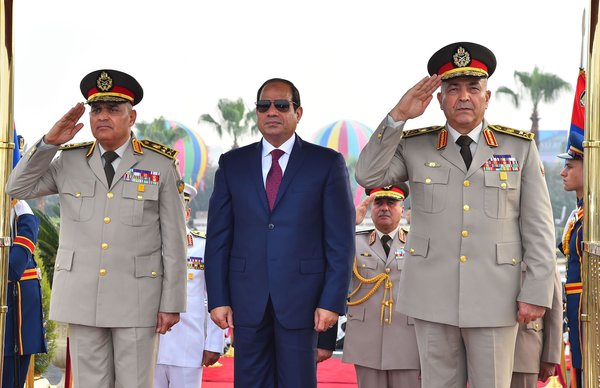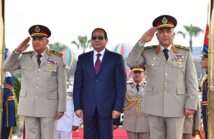The Saudis may have thought they were buying loyalty. But Egypt’s vote last month for a Russian United Nations resolution on Syria threatens to unravel Mr. Sisi’s relationship with Egypt’s most crucial benefactor.
Shortly after the vote, the Saudi ambassador to Egypt left Cairo for an unscheduled three-day visit to Riyadh. The state-owned Saudi oil company, Aramco, postponed a promised shipment of 700,000 tons of discounted oil in October, and the spokesman for Egypt’s oil ministry said the fate of November’s shipment remains unknown.
Then last week, the Saudi head of a major Islamic organization, who has since resigned, publicly mocked Mr. Sisi, exposing the rift in a new way.
Ahmed Moussa, a prominent Egyptian talk show host and staunch supporter of Mr. Sisi, was one of many Egyptian commentators who reacted angrily.
“They want to make Egypt kneel,” Mr. Moussa said of the Saudis, then offered his own threats. “Don’t you ever think you can pressure Egypt into backtracking,” he said. “Its decisions are sovereign. We don’t owe anyone anything. We are the ones who are owed.”
The fraying of the alliance between the two most influential Sunni nations is unfolding amid increasing sectarianism across the region. And the potential loss of Saudi support could hardly come at a worse moment for Egypt, whose economy is crashing amid a devaluing of its local currency, reduction in imports, and tourism tailspin.
Inflation in Egypt is at 14.6 percent, almost double the figure a year ago, and the government is awaiting approval of a $12 billion loan from the International Monetary Fund, which is likely to be conditioned on rolling back energy subsidies that could create political instability.
Saudi Arabia is itself grappling with the global decline in oil prices, and many of its longstanding political practices have been upended by Mohammed bin Salman, the deputy crown prince, who is now defense minister and the head of a powerful new council that oversees the state oil company.
Under Prince Mohammed, Saudi Arabia is going through a period of muscular nationalism and is trying to assert its weight as a Sunni regional power, particularly in trying to counterbalance Shiite Iran.
That has created a sense of wounded pride among Egyptians, who have long thought of their nation as the leader of the Arab world. They tend to be uncomfortable with their economic dependence on Saudi Arabia and sometimes dismiss the Saudis as oil-rich upstarts.
Still, the dependence is significant: Compare the $25 billion over two years from Saudi Arabia to the $1.3 billion annual military aid from Washington that Cairo has collected for years, part of the assistance Egypt has received since it signed a peace treaty with Israel in 1979.
Much of the recent hostility has been centered on the bloody conflict in Syria that is now in its sixth year. Saudi Arabia has long pressed for the ouster of the Syrian president, Bashar al-Assad, who is backed by Iran, while Mr. Sisi’s Egypt has been unofficially supportive of Mr. Assad.
Both the Russian draft and a rival French resolution offering various formulations aimed at halting hostilities in Syria failed to garner enough votes in the council. Egypt’s support for the Russians, however, managed to provoke a backlash by the Saudis.
And then there was that remark suggesting the extent of the kingdom’s exasperation, made by Iyad Ameen Madani, a Saudi who until Monday was chief of the Organization of Islamic Cooperation, which works to foster unity among 57 Muslim nations.
After mistakenly garbling the name of the Tunisian president, Béji Caïd Essebsi, by calling him “Béji Caïd el-Sisi,” Mr. Madani took a swipe at the Egyptian president that was instantly recognizable by all who follow politics here.
“I am sure your fridge has more than water,” Mr. Madani said to Mr. Essebsi.
It was a sly, dismissive reference to a widely derided comment Mr. Sisi had made at a recent youth conference. Urging young Egyptians to be patient as the country endures economic difficulties, Mr. Sisi said that he had lived for a decade with only water in his refrigerator and had not complained.
This prompted howls of derision on Egyptian social media, because Mr. Sisi had served for years in a military known for generous salaries, rising to be head of intelligence and eventually the entire system.
So when Mr. Madani revived the controversy with his offhand rebuke, Egypt’s foreign ministry blasted back, calling the statement “regrettable” and a “grave transgression,” and vowing to review its relationship with Mr. Madani’s organization.
Mr. Madani resigned on Monday “for health reasons,” the organization said in a statement after it issued an apology, saying he had been joking.
The broader rift between the two, on the other hand, is real, analysts say.
“How long can this all last?” asked Issandr El Amrani, the North Africa project director for the International Crisis Group, on the respected Arabist blog. “The relationship is based on a kind of asymmetric passive-aggressive perpetual renegotiation. What Egypt is saying, in effect, is: ‘I am an unreliable, disrespectful client that openly takes you for granted and jibes against you at every possible turn, but I know you will eventually come back to me because you are more afraid of my weakness and nuisance capacity than of my potential strength. So when is that next check coming?’”
But Mustapha Kamel al-Sayyid, a political science professor at Cairo University, said he did not expect the latest round of skirmishing to have major consequences.
Saudi Arabia will not stop bankrolling Mr. Sisi’s government, he said, because it needs him to prevent Egypt from descending into chaos at the Saudis’ border. He noted that the Saudis deposited $2 billion into Egypt’s central bank just days after halting the oil shipment last month.
“They will continue to cooperate because they have to,” Mr. Sayyid said.
“All of this is unlikely to cause a breakup,” he added. “It just adds tension to the
---------------------------
The newyork Times









 Home
Home Politics
Politics











